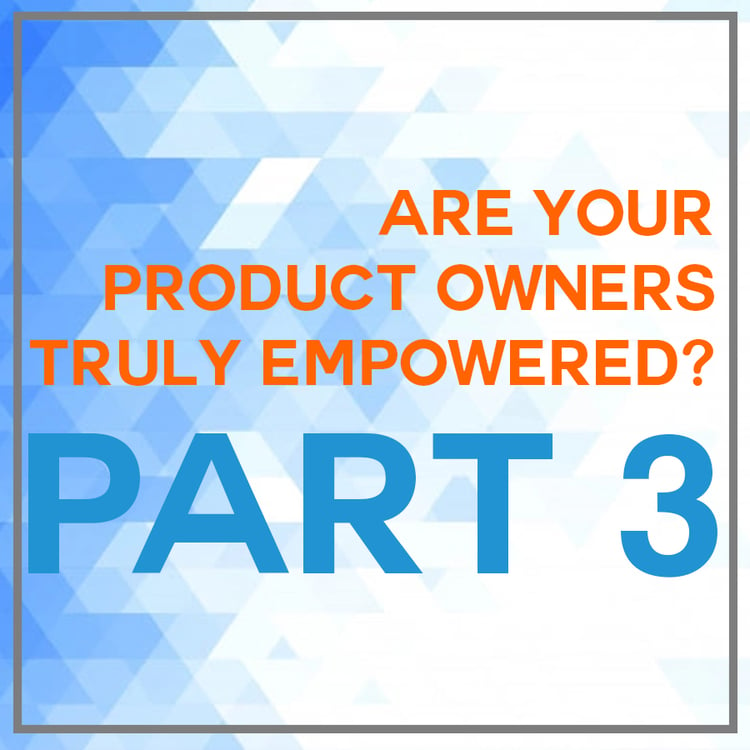Are your Product Owners Truly Empowered? Part 3

In the first installment of our Product Owner Empowerment series, we talked about the three crucial dimensions of knowledge that a Product Owner’s effectiveness is measured on. We looked at how various aspects of empathy influence a Product Owner’s ability to connect with the team, client and organization in our second post. In our third and final post in this series, we are going to look at the impact that psychological safety has on a Product Owner’s success.
Psychological Safety: Psychological safety is a state of mind and a cultural aspect that is created and fostered by someone or something other than the subject themselves. When people in the organization are afraid to make difficult choices and shy away from having tough conversations, it is generally due to a lack of psychological safety. Various factors contribute to how safe people feel psychologically in an organization. Empathy, as discussed above, at all levels plays a big role in this. If the culture, in general, is more empathetic, there will be a higher level of psychological safety. However, it is not the only factor. Let’s dig a little deeper on this factor and see how PO’s success is tied to psychological safety for themselves and the teams they are working with.
- Psychological Safety for Teams: In the case of teams, it is usually the leaders that are responsible for ensuring that team members feel psychologically safe to work in challenging situations with often unpredictable outcomes. Agile requires teams to be flexible and collaborative in their approach to address the ‘just-in-time’ nature of work. Innovation, exploration, and taking risks is a necessity to succeed in such an environment. This comes with the possibility of teams running into occasional failures that should be treated as learning opportunities. But, if the organizational culture is not forgiving of failures, it leads to teams not feeling safe enough to take the risks and challenges they may need to, to optimize value delivery. Leaders should actively address the topic of psychological safety and ensure that they foster a culture that encourages innovation and taking calculated risks.
- Psychological Safety for the Product Owner: The Product Owner is in a unique position having a tremendous influence on a team’s psychological safety, but in turn, are equally or proportionally affected by the psychological safety afforded to them by their leadership. A Product Owner who is well engaged with the team will need to make decisions regarding priority, scope, and timelines. An empowered Product Owner will be able to make such decisions with appropriate communication, keeping the team working at a sustainable pace. However, we often see organizations where such pivots must go through multiple levels of approvals, often surrounded by process constraints and red tape. This causes the organization to see change as undesirable and anyone bringing the change is viewed as the bearer of bad news.
Having leadership that welcomes change, is key to providing psychological safety to the Product Owner and the team. It is not sufficient for leadership to merely say that they support and welcome change. They need to look at systemic and cultural aspects of the organization that might be working against this mindset and actively work to realign them to an Agile way of working. It may not be the norm in some organizations to have leadership unsupportive of change, but a delay in the ability to pivot can lead to periods of unsustainable workload on the team while the Product Owner is negotiating upwards. To truly support psychological safety, allowing for making difficult choices and having tough conversations, organizations need to embrace decentralization decision making and empower the Product Owner and teams as much as possible.
Conclusion:
I hope you enjoyed this series. Throughout these three posts, we explored various factors that impact the ability of a Product Owner to work effectively in their role and serve the purpose they are meant to. They must be empowered with knowledge of not just the business domain, but also the delivery and process knowledge to successfully operate in the organizational context. Empathy at different levels of the organization and towards the customer, whether they are internal or external, is crucial to move the product in the right direction. Psychological safety is often an unmeasurable and underlying factor that should be proactively managed by leadership and ingrained in the culture and processes of the organization to truly empower their Product Owners.
As a final thought, if you’ve enjoyed this series or have additional questions on how to truly empower your Product Owners, join me for a FREE webinar on Product Owner Empowerment. We have a few seats available (on a first-come basis) and invite you to register today.
More from the blog
View All Blog PostsSubscribe to Our Blog
Fill out your email address to receive notifications about new blog posts from CC Pace!

